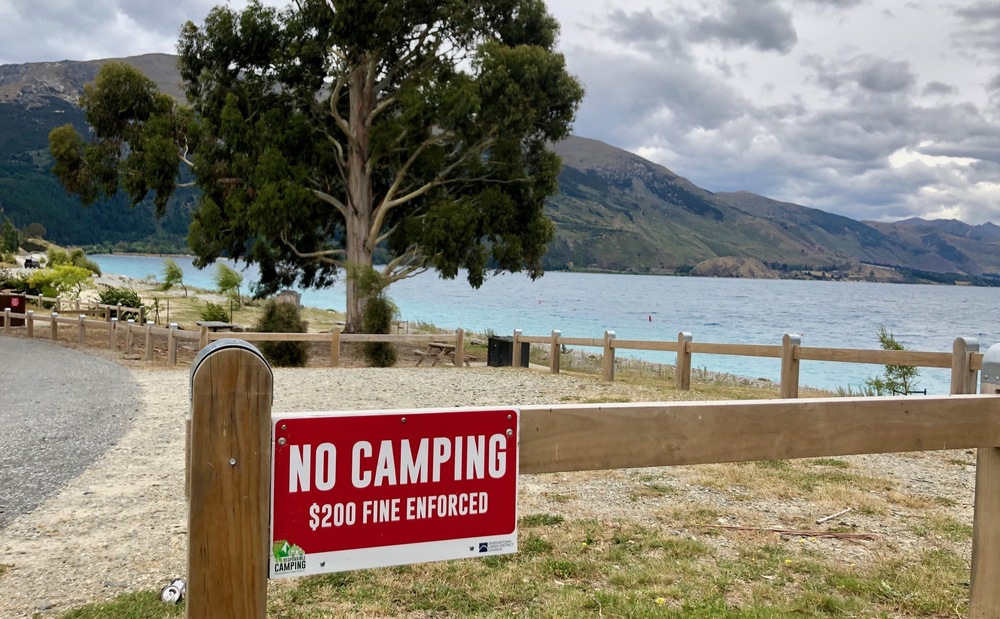Illegal camping decreases on Hāwea wardens’ turf
Diana Cocks
13 February 2021, 5:42 PM
 Hāwea warden Diana Turnbull at one of the popular parking spots along Lake Hāwea Esplanade Reserve.
Hāwea warden Diana Turnbull at one of the popular parking spots along Lake Hāwea Esplanade Reserve.After years of tackling numerous cases of illegal camping along Lake Hāwea’s popular Esplanade Reserve, community wardens are currently enjoying a more sedate pace with fewer infringement notices issued.
Lake Hāwea’s five unpaid wardens, who are tasked with patrolling the town’s foreshore where camping is prohibited, have noticed a marked decrease in the number of campers.
A warden for 10 years, Diana Turnbull said two or three years ago they would be infringing 50 to 100 freedom campers every night at the height of the summer season and 15 to 20 throughout the rest of the season from October to April.
Around Christmas and New Year when live concerts at the Hāwea Hotel were a regular feature and hundreds flocked to the lake for holidays, the wardens would be handing out infringement notices “as fast as we could write them,” Diana said.
In contrast, she told the Hāwea Community Association at a recent meeting, this season the wardens have infringed between two and four freedom campers every couple of weeks.
“There has been no problem. It’s never been like this before; it’s just amazing,” Diana said.

It’s a $200 fine for camping in the prohibited areas along the Lake Hāwea Esplanade Reserve.
She attributes the vast drop in illegal campers to various reasons; fewer overseas visitors (before the border closures about 70 per cent of those approached by the wardens were from overseas); encouraging responsible camping through education; new ownership at the Hāwea Hotel resulting in fewer concerts; and greater awareness of inexpensive accommodation options, such as Bookabach and campgrounds.
Diana also acknowledges there is a certain element of “whack-a-mole” happening; that is, illegal freedom camping is decreasing on her turf but increasing at other locations, particularly along the eastern and western edges of Lake Hāwea.
The Lake Hāwea warden initiative originated with the local community asking the Queenstown Lakes District Council (QLDC) to support its voluntary efforts to monitor the foreshore which was being overrun in places by campers making a mess of the environment.
The locals were willing to establish a roster of volunteers to patrol the beach areas in the evening, advising those parked there they needed to find another place to camp, and returning at dawn to infringe those who camped illegally overnight.
The support they sought from the QLDC was clear signage and “teeth” - the ability to legally enforce the bylaw which prohibited camping.
Diana, who has been involved with monitoring the foreshore for more than 15 years, said it was an uphill battle initially to get the council staff to see the merit of the warden initiative, but in 2011 the former mayor Vanessa Van Uden agreed to a trial and the wardens have been operating ever since.
Diana said it’s been an ongoing struggle to get decent signage but the ability to write legally enforceable infringement notices with a $200 fine for breaching the law has made all the difference.
She said it’s sad the “the carrot and stick” approach was needed, but she has no qualms about writing infringement notices for those deliberately flouting the law.
Some freedom campers would try to conceal their vehicles behind bushes and it was those who were often the worst culprits for leaving a mess.
“Those hiding in the bushes are not going to walk to the nearest toilet in the middle of the night,” she said.
Diana said the council’s recent use of taxpayer funded “ambassadors” was useful in the education of freedom campers, but she believed the unpaid wardens were an effective solution in their own right.
“We live here; we care; it’s our backyard; [and] we will still be here in years to come.”




